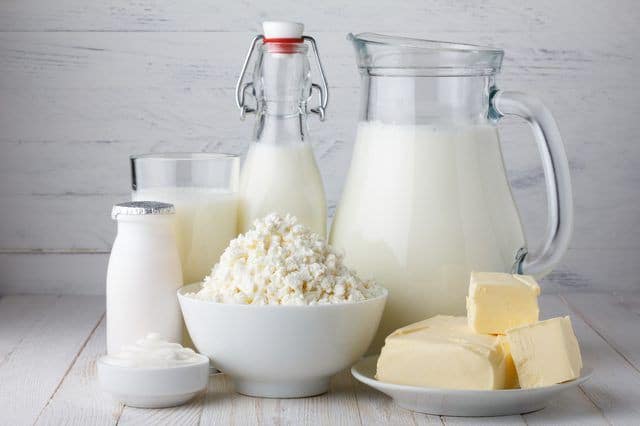Dairy products, also known as milk products are food products made from milk. This milk may be produced from animals such as cows, nanny goats, ewe, water buffalos, and in central Asia, camels and yaks are used. However, the majority of dairy products are from cow milk.
Dairy products include milk, yogurt, milk, and butter. Industries that produce dairy products are known as dairy. Dairy products are consumed in large quantities worldwide and while a large percentage of it is consumed, some people can not consume dairy products.
This is because they may be lactose intolerant, vegetarians or they may have health issues and beliefs they uphold strongly. Below are the benefits of adding dairy products to your diet;
Table of Contents
Benefits of Adding Fresh Dairy Products to Your Diet
Dairy products provide many health benefits, but the main benefit includes the significant and diverse nutrients that they provide. Except for purely fat butter, milk-based products contain protein, calcium, and phosphorus.
They contain numerous vitamins and minerals including B12. It has also been established that dairy products (milk products) such as calcium, phosphorus, and protein are good for the bones. They protect the bones against fractures.
Other benefits include:
- It helps support normal immune functioning.
- It aids growth and brain development.
- It helps to maintain a healthy blood pressure.
- It reduces energy from foods.
- It reduces stress and fatigue.
- It keeps your muscles, bones, and teeth healthy.
Above all, be it full-fat, or low-fat dairy foods, both play a significant role in the body, as they are good sources of protein, calcium, B vitamins, and vitamin D. While some of these dairy products undergo fermentation, such as yogurt and cheese, they are lower in lactose and contain healthful gut bacteria that are beneficial to digestive health.
Side Effects of Dairy Products in Your Diet
As much as dairy is good for the body, it also has some adverse effects it can cause depending on your body type, which is why you must be aware of your body type before consuming anything. Here are a few adverse effects of dairy products:
-
Lactose intolerance and allergies
There are some dairy products certain individuals cannot digest because they are lactose intolerant or allergic to them.
To be lactose intolerant means not being able to digest the particular sugar type present in milk products. Lactase is a digestive enzyme that children produce when they are little to aid the digestion of lactose.
However, many people lose the ability to break down lactose when they become adults. Many people are allergic to these products. Statistics have it that 68% of the world’s population is lactose intolerant. These people may develop symptoms such as bloating, diarrhea, and abdominal cramps when they consume milk products.
-
Sodium infused content
Cheese as a hard-aged dairy product contains a large amount of sodium. And since sodium is a mineral, it is not, not good for diet. However, depending on the overall diet, high intakes of cheese may push the consumer over the recommended daily intake for sodium which is 2300g. High intake of sodium can lead to increased high blood pressure.
-
Cancer
Dairy products sometimes invigorate the release of insulin-like growth factor 1 (IGF 1) and this is associated with an increased risk of certain cancer types – most especially prostate, breast, and colorectal cancers. Although the research on the link between dairy and cancer is inconclusive, evidence shows that the type of dairy consumed may play an important role in the outcome.
For example, studies show that 1 out of 778,929 persons, suggested that while total dairy products didn’t increase cancer mortality risk, whole milk intake did increase the risk of prostate cancer.
Contrary to these stats, fermented dairy products such as yogurt, are associated with reduced cancer risk.
-
Saturated fat
Dairy foods such as butter and ghee, are significant sources of saturated fat. The Dietary Guidelines for America, recommend limiting saturated fat intake to 10% this would amount to 22 grams of fat for a 2000-calorie diet.
Diets containing high saturated fat content can increase low-density lipoprotein cholesterol (LDL-C) and apolipoprotein B (Apo-B) levels. With these in call, there is a high chance of an increase in cardiovascular disease.
For more tips and resources that will help your overall growth, join our WhatsApp community here.
Best Types of Dairy Products for Your Health
The healthiest and most eco-friendly dairy products come from cows that are pasture-raised and grass-fed. Their milk has a better nutrient profile and a beneficial fatty acid profile. Fermented dairy products such as yogurts are considered better because they produce probiotics and research consistently links them to lower risks of Type II diabetes, cancer, and heart disease.
It is also interesting to note that people who cannot digest lactose from cows may be able to digest the ones from goats. A few other dairy products, good for your health include:
-
Buttermilk
Buttermilk is a dairy product but isn’t as famous as its two namesakes with butter and milk being pervasive.Traditionally, buttermilk is a leftover pale yellow, liquid after churning butter. It is a sour-tasting dairy product. It can be drunk as it is and can also be used to marinate meat.
This is because buttermilk has a high proportion of lactic acid(hence the sour taste) which works well as a tenderizer.
-
Cheese
Cheese is a fermented dairy product that comes in different shapes and sizes and is eaten all around the world. It is delicious and every country has its types. Some include:
- Cheddar Cheese (England)
- Manchego (Spain)
- Mozzarella (Italy)
- Parmesan (Italy)
- Feta (Greece)
While some cheese may be hard with a strong flavor, others may be mild and soft. Even though it is a source of saturated fat, studies show cheese as being neutral or inversely associated with cardiovascular risk. It is an excellent source of protein and its fat concentration varies depending on the quantity.
Read also: 10 Amazing Health Benefits of Mustard Seeds.
-
Cream
Cream is a high-fat dairy product that contains a butterfat layer at the top of the milk, before the milk homogenization process. There are many types of cream and the fat percentage is between 18% and 55% depending on the type.
However, the biggest deal is the taste. Everything and anything tastes better when cream is added. Although it contains a significant amount of saturated fat and is not nutrient-rich. It is better enjoyed moderately.
-
Milk
Milk is a popular dairy product and is consumed everywhere in the world. It also serves different purposes such as cooking, raw consumption, and the like. There are different milk varieties from regular cow to goat milk and reduced fat options. Each of these kinds of milk has a varying taste and nutritional profile, so the best option depends on the consumer’s diet.
-
Protein puddings
Protein puddings are high-protein dairy products made from skimmed milk, milk protein, thickeners, flavorings, and sweeteners. It comes in various flavors such as vanilla and chocolates and is aimed at busy people and gym-goers for an on-the-go protein snack. It also comes in single-serve containers.
Conclusion
Dairy products contain a wide variety of nutrient-rich food and beverages that are made from or contain milk. For the most part, they have a lot of health benefits. However, there are still inconclusive stats regarding their benefits and potential downsides.
Also, some people who can tolerate lactose in their young days, grow up to become lactose intolerant, which is why you should always check yourself.
Subscribe to our newsletter to receive notifications of our latest posts on Nigerian Lifestyle, Business, Campus, and many more.
About Author
Latest entries

 WomenMay 10, 202410 Perfumes for Women You Should Know
WomenMay 10, 202410 Perfumes for Women You Should Know SpiceApril 15, 2024Top 10 Nigerian Comedy Movies You Need to Watch
SpiceApril 15, 2024Top 10 Nigerian Comedy Movies You Need to Watch

